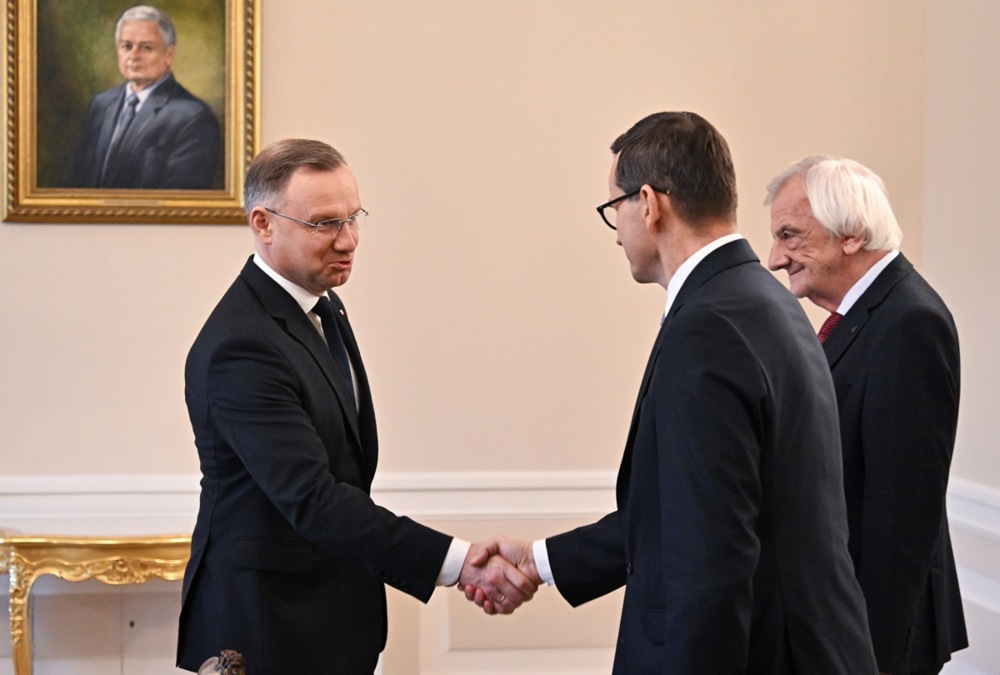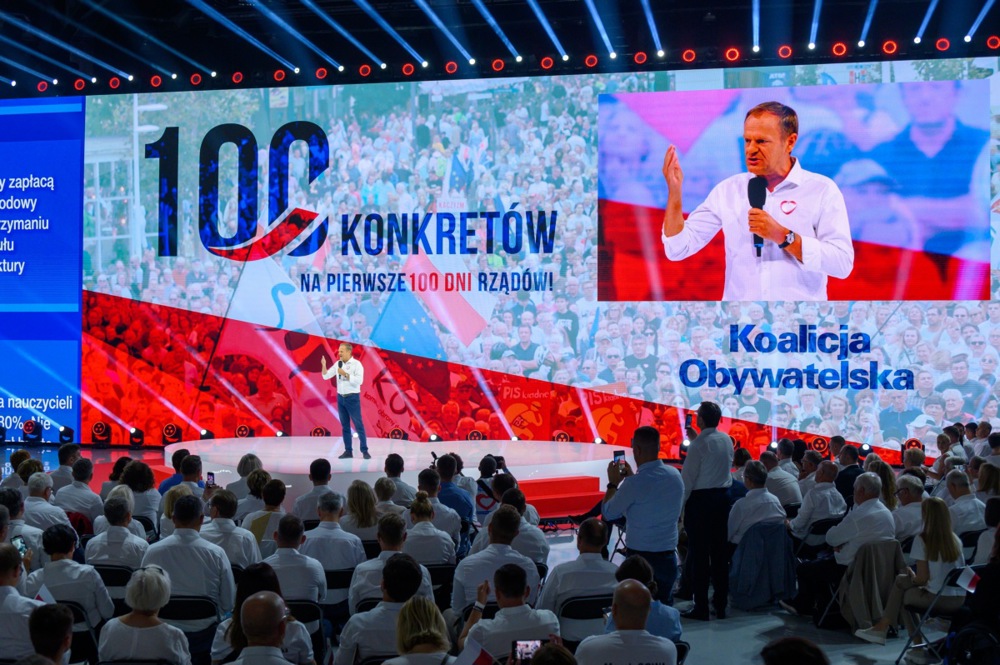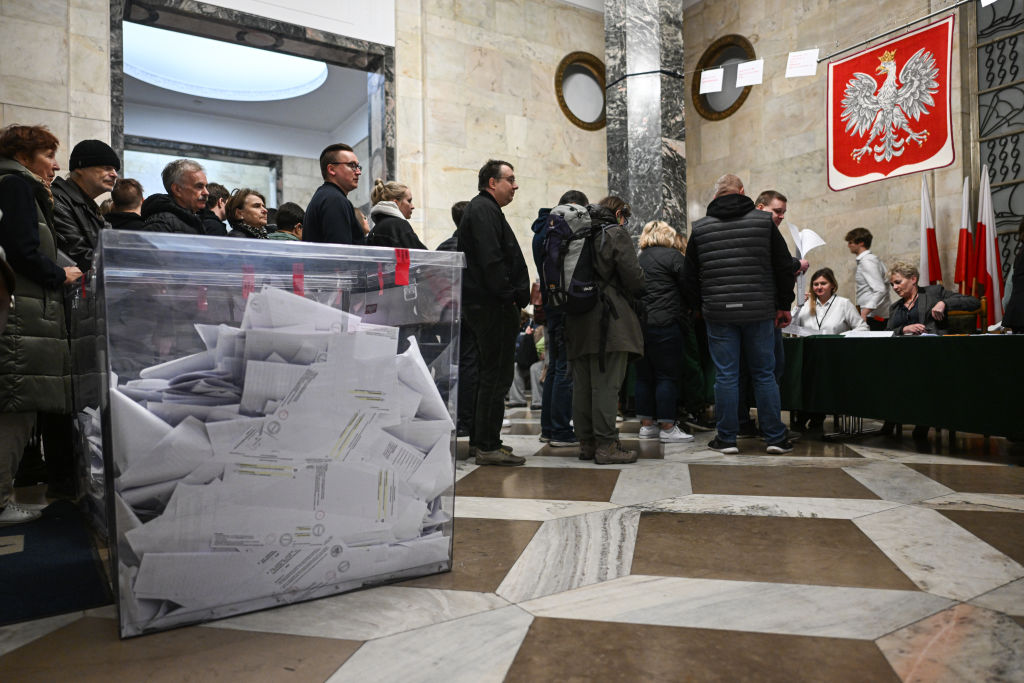Jaroslaw Kaczyński, leader of Poland’s Law and Justice party (PiS), is making it plain to voters in the European elections what he does not like.
He does not like changes to EU treaties. He does not like the European Green Deal, which he reckons will hurt Polish agriculture. He does not like the EU migration pact.
As for the proposed EU building directive, Kaczyński says that will force higher energy prices and increased costs for business and aviation.
The proposed idea of a European army is also a bad idea. Kaczyński says Poland needs to keep its security tied to its alliance with NATO and the United States.
That is what Kaczyński and PiS are against. The problem is that their list of grizzles is not a strategy to win an election. PiS offers no proposals, no initiatives. It leaves supporters longing for a leader with the diplomatic subtlety and realism of Italy’s prime minister, Giorgia Meloni.
Yet there is a lot of meat in the PiS opposition to EU changes, if the party would just package their position in a way that is more tasty.
The great feature of the European elections in Poland is the theme of the European treaties change. This focus on the treaties appears to be largely isolated to Poland, with other nationalist parties across Europe seeming unaware or indifferent to the issue.
In Poland, it is big.
A key point of the changes proposed by the European Parliament’s Committee on Constitutional Affairs (AFCO) is the elimination of the veto right in the Council of the European Union. This would move decision-making to qualified majority voting in at least 65 policy areas and kill the national power of a veto.
Another proposal involves restructuring the European Commission by reducing the number of commissioners to 15. This would leave almost half of EU member states without a commissioner, a great blow to smaller states who see their national eurocrat in the commission as a point of prestige, and an insult to all states left without a voice at in the “college of commissioners.”
EU financial and economic concerns are also prominent, with proposals such as the mandatory adoption of the euro raising fears about undermining Poland’s economic sovereignty.
Critics worry about the potential for punitive use of EU funds against states that do not align with EU policies, noting the significant role these funds play in Poland’s development.
There are also social and cultural dimensions to the proposed reforms. The replacement of the principle of gender equality with a broader concept of gender equity has sparked fears of undermining traditional family values and cultural norms.
PiS politicians also fear that the reforms proposed by the AFCO could lead to Poland losing its powers within the EU, its sovereignty, and its financial autonomy, ultimately becoming a German-dominated state.
However, some experts argue that these fears are exaggerated, explaining that the European Parliament’s resolution voted in favour of amending the EU treaties after the adoption of the report by the AFCO was about creating a starting point for discussions.
Any actual treaty changes would require extensive discussion, agreement among all member states, and approval by national parliaments, including Poland’s Sejm and Senate (of which PiS itself still holds a blocking portion).
In any case, the topic allows PiS to highlight what can best mobilize its traditional electorate in the European context: the fight for sovereignty.
Yet even on the issue of sovereignty, PiS faces a significant challenge in its focus on appeasing its core base, prioritizing loyalty from hard-liners over broader appeal.
This approach underscores the internal struggle by PiS to maintain cohesion, which heavily hinges on the leadership of the 74-year-old Jarosław Kaczyński. His eventual departure could unravel the party because there is a lack of unity and a clear succession plan.
The party’s candidates list for the European elections reflects an unwillingness to embrace reform or fresh ideas, with the older generation maintaining a firm grip on the status quo.
An interesting angle on this is the disappearance of the old version of TVP Info, a television news channel that was, until the election of the new Tusk government, strongly in favour of PiS. In fact, TVP Info appears to have negatively impacted PiS, as many of its members considered the channel’s “party propaganda” a significant error.
Now there is a new conservative-leaning TV channel which has emerged on YouTube (Kanał Zero), attracting considerable attention with hosts such as Sławomir Dębski, a prominent geopolitical analyst, and Rajmund Andrzejczak, the former Chief of the General Staff of the Polish Armed Forces from 2018 to 2022.
The owner of this innovative project, Krzysztof Stanowski, perceives the Polish media as having declined in quality and misled audiences. He hopes to deliver more meaningful content, which for now seems to be a success.
Yet the party goes on relying on the perceived instability of the ruling coalition to regain power, rather than presenting a compelling alternative vision.
PiS has yet to adjust its strategies following its parliamentary election loss. They are continuing to employ the same tactics that failed them before. The party has not found an effective new approach, reflecting a passive Polish political landscape that awaits generational change.
In contrast, the younger generation of Polish nationalists is focusing on a more constructive agenda. They are primarily rallying around infrastructural initiatives like the Central Transportation Hub (CPK), a project that has garnered majority support among the Polish population, despite Donald Tusk’s concerted efforts to oppose it, calling it a “sick idea.”
The hub, based around a new central airport, is projected to accommodate around 40 million passengers in its first year. Additionally, new high-speed railway lines will enhance connectivity across the region, facilitating travel to and from other parts of Europe. By 2060, it is estimated that over 65 million passengers will pass through it.
U.S. Army General Ben Hodges described the new CPK transport hub as “what NATO needs in terms of military mobility,” stressing that it will “add a capability and capacity that no other node in Poland, or elsewhere in Eastern Europe, can match.”
Tusk’s stance on the project, reflecting his party’s typical caution about Poland becoming a significant player in defence with the inherent risks involved, has the potential to frustrate a substantial portion of the population, which has grown more ambitious and confident in the nation’s prospects.





The murky history of Civic Platform’s Russia policy: Donald Tusk and Radosław Sikorski appeased the Kremlin when they were last in office